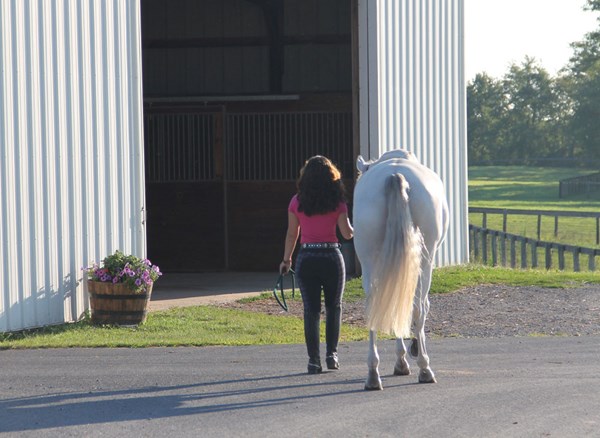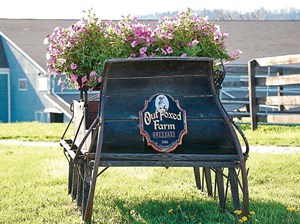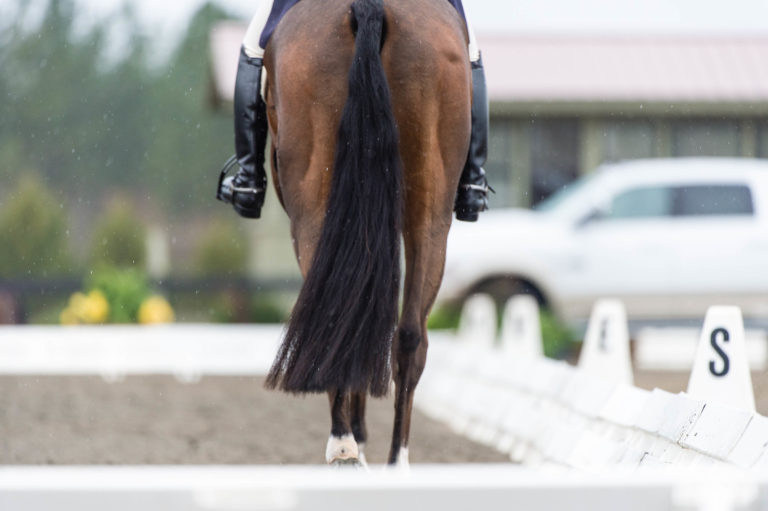
As days lengthen, pastures thaw and horses’ coats shed, it is easy to get swept up in the excitement of riding. However, spring is an optimal time to complete equipment- and facility-maintenance projects, which can have a positive impact on operations throughout the year.
Carol Seaman, USDF silver medalist and “L” Education Program graduate, is the owner and trainer at the 76-acre Outfoxed Farm in Orange County, New York. According to Seaman, “The way a barn looks when you walk in—how the aisles are swept or raked, how the stalls are kept, fresh water buckets all the time, how the horses look—it’s all a reflection of the quality of care.”
Jaclyn Sicoli, USDF bronze and silver medalist, “L” Education Program graduate with distinction and founder of Peace of Mind Dressage, is the head trainer at Woodvale Farms in Frederick, Maryland. At the 158-acre facility, Sicoli emphasizes a “functional, clean and peaceful horsey environment,” which she relates directly back to the horses’ well-being.
Seaman and Sicoli agree that “spring cleaning” is one important element of the bigger picture of effective horse care. While both trainers oversee full-service boarding and training facilities with large herds (35 horses at Outfoxed Farm and 27 under Sicoli’s care at Woodvale), many of the springtime projects they identify apply to barns of any size. What’s important is the broader goal of attending to projects that could not be dealt with during winter weather to prepare for a successful spring and summer season of horse care, facility use, riding and training.
Following are projects that can be adapted to facilities of any shape or size.
Inspect and deep-clean stalls. Stalls and indoor buckets should be kept as clean and fresh as possible throughout the winter. At Outfoxed Farm, stalls are stripped on a regular basis year-round and stall walls scrubbed inside and out. Cobwebs are removed regularly. Seaman emphasizes that the key to easy spring cleaning is keeping up with maintenance on a daily/weekly basis year-round. “Don’t wait until spring if it can be done right away. My working students and employees are asked to look around the stall as if they were a horse and had to live in there. They each spend enough time inside the stalls while mucking, putting boots and blankets on the horses and so on, that it just takes that extra minute to check.” In this way, Seaman and her staff ensure that stall walls, floors, buckets and hardware remain clean and in good repair.
For those planning to especially refresh stalls in spring, it is advisable to completely strip all stalls and even remove rubber mats, giving everything a chance to dry out completely after a long winter. Mats, buckets and stall walls can all be cleaned with a chlorine-bleach and hot-water solution and then rinsed thoroughly. The use of calcium carbonate (barn lime) and other products designed to absorb odor and neutralize ammonia on stall floors is somewhat debated both for optimal safety and overall effectiveness. Therefore, if there is a perceived need for a drying product, it is best to first consult with one’s veterinarian.
Clean winter blankets. Both Seaman and Sicoli use blanketing services and emphasize getting winter blankets cleaned in the spring, as soon as they are no longer in use. “We collect blankets from all of our boarders and take them to a local facility that does waterproofing, washing and care,“ says Sicoli. “This way, the next time that cold weather sets in, the blankets are cleaned, sealed in plastic and ready for use. In the fall, you won’t be caught off guard by a cold snap.”
Encourage group effort. Seaman asks her boarders to do their own spring cleaning of tack trunks and personalized space. Using humor to emphasize the role each individual plays in maintaining a tidy barn, she quips, “When in doubt, throw it out!” and “If it’s not in your trunk, we might think its junk!” She also encourages boarders to pull out their horse’s scrim sheets, fly sheets, ear bonnets and fly spray and have everything where it needs to be for use by the staff.
Clean and repair tack. Dampness followed by dry winter weather and constant temperature changes are hard on leather tack. “Conditioners don’t tend to work as well in winter months,” says Sicoli. “Lots of people who don’t have heated tack rooms avoid cleaning tack in the winter. In that case, come spring, you would want to do a “super-cleaning” of your saddle, bridle and other equipment.”
Clean and inspect water buckets, troughs and heaters. In New York, Seaman has automatic waterers for buckets in stalls and pasture troughs. Fortunately, both require only routine maintenance checks to keep them up and running safely. However, those who rely on portable heated water buckets, submergible heaters or de-icers in water troughs should remove this equipment from use as soon as possible in the spring. Equipment should be checked carefully for any signs of wear and cleaned thoroughly according to manufacturer’s directions. Keep in mind that mineral deposits can accumulate when these tools are in use and they need to be cleaned away before storage to prevent permanent damage. Finally, allow this equipment to dry completely and then store indoors.

Because cleaning outdoor water troughs during brutal winter weather can be challenging, Seaman suggests that giving troughs a really good scrubbing with bleach so all the bacteria is scrubbed out, followed, of course, by very thorough rinsing should be part of every spring cleaning.
Prepare for travel. Whether a horse trailer has been in use throughout the winter or sitting dormant, early spring is the perfect time to send it out to a qualified mechanic for an annual maintenance check. In addition to having your trailer serviced, it’s important to maintain the roads and driveways you need to get in and out of your property. “Freezing and thawing throughout the winter can take its toll on fields, driveways and parking lots,” says Sicoli. “These areas always needs to be checked and repaired as needed in the spring.”
Power-wash and paint barns and fences. Sicoli says that each spring they power-wash the stalls, barn and indoor arena to get the dust from winter off. In addition to giving the indoor arena walls a fresh coat of paint, Woodvale staff also inspects fences. “Staining wood can’t be done in the winter because you need a certain temperature,” says Sicoli. “Therefore, if there is a fence that is starting to look a bit aged, spring is a good time to repair it.”
Attend to arena footing. Seaman and Sicoli are both proactive with their arena footing and have the equipment to maintain it year-round. For Seaman, this means watering the footing every morning from overhead sprinklers, then personally dragging the arena with a small tractor and an arena groomer. In spring, this machinery (along with several mowers, tractors, their attachments and a manure spreader) also gets whatever is required for regular maintenance (i.e., an oil change, tune up, tire and brake check).
However, even with this on-going attention to the footing, Seaman considers it important to give arena footing a close assessment each spring. “Our footing is a combination of sand, rubber and geofabric,” she explains. “It’s a blend I can adjust to the way I want it. So, I usually have to make that decision come springtime—do we need a little more sand, more fabric or a combination? It all depends on how it’s survived the winter.”
Focus on overall maintenance. In addition to all the practical elements associated with keeping a barn in top shape, spring is the perfect time to ensure the facility is pleasing to the eye and peaceful for the soul. “Generally speaking, during the winter we don’t have as many public events,” says Sicoli. “When springtime comes, we change the use of the facility and start hosting more clinics and shows. So, a main priority is anything that has to do with the appearance of the facility and the use by the public.” For her, this may mean driveway repair, but it also includes aesthetic elements—simple touches like replacing the tablecloths in the viewing room.
Seaman adds, “Whether we are hosting events or not, we always do flowers in springtime. Flower beds run alongside the outdoor arena. There are hanging baskets in front of the porch, and we have some big pots beside the barn.” She emphasizes how hard everyone works to keep the facility looking beautiful. “It’s not like we have a paid gardening service to do this work, and I believe most farms operate that way. I think it’s refreshing when you have boarders who notice and comment that the flower beds look beautiful. It makes you want to do more.”
While Seaman doesn’t expect her clients to chip in, she certainly welcomes their support. After all, spring is the perfect season for spending an extra hour at the barn, supporting your horse’s team and contributing to the beauty all will enjoy throughout the year.











